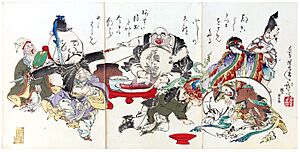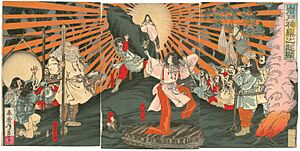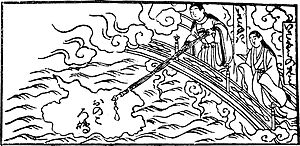List of Japanese deities facts for kids
This article is about the many gods and goddesses found in Japanese beliefs and traditions. Many of these come from Shinto, which is Japan's native religion. Others arrived in Japan through Buddhism or Taoism and became part of Japanese mythology and folklore.
Contents
Early Gods of Creation
Some of the very first gods in Japanese mythology are called the Kotoamatsukami. They are believed to have appeared at the very beginning of the universe.
- Amenominakanushi (天之御中主神) – The Central Master
- Takamimusubi (高御産巣日神) – The High Creator
- Kamimusubi (神産巣日神) – The Divine Creator
- Umashi'ashikabihikoji (宇摩志阿斯訶備比古遅神) – Represents energy or chaos
- Amenotokotachi (天之常立神) – Represents the heavens
Important Japanese Gods
- Amaterasu-Ōmikami (天照大神) is the powerful goddess of the sun. She is also believed to be the ancestor of Japan's Imperial family. Her name means "Shines from Heaven." Because of her connection to the Imperial family, she is often seen as the most important god in Shinto.
- Ame-no-Uzume (天宇受売命 or 天鈿女命), often called Uzume, is the goddess of dawn and fun celebrations in Shinto.
- Fūjin (風神), also known as Kaze-no-kami, is the Japanese god of the wind. He is one of the oldest Shinto gods and is said to have been there when the world was created. He is often shown as an oni (a kind of demon or ogre) carrying a bag on his back.
- Hachiman (八幡神) is the god of war and a divine protector of Japan and its people. He started as a god of farming but later became the guardian of the Minamoto family. His special animal and messenger is the dove.
- Inari Ōkami (稲荷大神) is the god or goddess of rice and fertility. Their messengers and special animals are foxes.
- Ninigi-no-Mikoto (瓊瓊杵尊), usually called Ninigi, was the grandson of Amaterasu. His great-grandson was Emperor Jimmu, who became the first emperor of Japan.
- Ōkuninushi (大国主) is a god of building nations, farming, business, and medicine.
- Omoikane (思兼) is the god of wisdom and intelligence. He is always asked for advice by the gods in heaven.
- Raijin (雷神) is the god of thunder and lightning. He is often seen with Fūjin. Like Fūjin, Raijin is usually shown as an oni.
- Ryūjin (龍神) is a dragon and the god of the sea. Some people believe he is the same god as Ōwatatsumi.
- Suijin (水神) is the god of water.
- Susanoo-no-Mikoto (須佐之男命 or 素戔嗚尊) is a god of storms and sometimes the ruler of the sea. He is also a bit of a trickster god. Japanese stories often tell about the "sibling rivalry" between him and Amaterasu. Susanoo also famously defeated the monster Yamata no Orochi and found the special sword Kusanagi.
- Tsukuyomi-no-Mikoto (月読命 or 月夜見尊) is the god of the moon. He once killed the food goddess Ukemochi because he was disgusted by how she made food. This made Amaterasu so angry that she refused to face him again, which is why the sun and moon are in different parts of the sky.
- Yatagarasu (八咫烏) is a special three-legged crow. He is seen as a symbol of the sun and guided Emperor Jimmu.
Gods of Creation: Kamiyonanayo
The Kamiyonanayo are a group of seven generations of gods who appeared after the Kotoamatsukami. They played a big role in creating the world.
- Izanagi: (伊邪那岐神) was a god of creation. He is part of the seventh generation of the Kamiyonanayo, along with his wife and sister, Izanami.
- Izanami: (伊邪那美神) was a goddess of creation. She is also part of the seventh generation of the Kamiyonanayo, along with her husband and brother, Izanagi. Together, Izanagi and Izanami created the Japanese islands and many other gods.
- Kuninotokotachi (国之常立神) was one of the very first gods to appear by himself, making him the first of the Kamiyonanayo.
- Other early gods in this group include Toyokumono, Uhijini and Suhijini, Tsunuguhi and Ikuguhi, Otonoji and Otonobe, and Omodaru and Ayakashikone.
Other Gods and Goddesses
- Amatsu-Mikaboshi (天津甕星) is a god of stars who existed even before the Kotoamatsukami.
- Amatsumara (天津麻羅) is the god of iron-working.
- Ame-no-Tajikarao (アメノタジカラオ) is a strong god who, in some stories, helped pull Amaterasu out of her cave.
- Kagu-tsuchi (カグツチ) is the god of fire.
- Kaya-no-hime, the goddess of plants, grass, and fields.
- Kuebiko (久延毘古) is the god of knowledge and farming. He is shown as a scarecrow who can't walk but knows everything.
- Kuraokami (闇龗) is a legendary Japanese dragon and a Shinto god of rain and snow.
- Kōjin (三宝荒神) is the god of fire, the hearth (fireplace), and the kitchen.
- Sukuna-Biko-Na (少名毘古那) is a small god of medicine and rain. He helped Ōkuninushi create and make the land firm.
- Sumiyoshi sanjin are three gods of the sea and sailing.
- Sarutahiko Ōkami (猿田毘古神) is a god of the Earth who guided Ninigi to the Japanese islands.
- Toyouke-Ōmikami is the goddess of food.
- Ukanomitama is a god connected to food and farming.
- Ukemochi (保食神) is a goddess of food.
Mountain Gods
These gods are connected to mountains and nature.
- Konohanasakuya-hime (木花之開耶姫) is the wife of Ninigi and the daughter of Ōyamatsumi. She is also known as the goddess of Mount Fuji.
- Ōyamatsumi (大山積神) is an older brother of Amaterasu and an important god of mountains. He is also the father of Konohanasakuya-hime.
People Worshipped as Gods
Sometimes, important historical people in Japan were later worshipped as gods (kami) after they died.
- Shōtoku Taishi was a famous prince. Sometimes, Shinto followers worshipped him as the god of building and easy childbirth.
- Tokugawa Ieyasu (徳川家康) was a powerful leader who united Japan. He is worshipped at Nikkō Tōshō-gū and other shrines.
- Toyotomi Hideyoshi (豊臣秀吉) was another great leader, worshipped at Toyokuni-jinja.
- Tenjin (天神) is the god of learning and scholarship. He is actually the deified Sugawara no Michizane, a scholar who was unfairly exiled.
- Emperor Jimmu (神武天皇) was the first emperor of Japan. He is worshipped at Kashihara Shrine.
- Emperor Meiji (明治天皇) and Empress Shōken (昭憲皇太后) are worshipped at Meiji Shrine.
Gods from Buddhism
Some gods and important figures from Buddhism were also welcomed into Japanese beliefs.
- Amida Nyorai (無量光佛 or 無量壽佛), often called Amida-butsu (阿弥陀如来), is a main Buddha in a type of Buddhism called Pure Land. He is known for his endless good qualities and is seen as the "Lord of the Afterlife."
- Daruma (達磨) is traditionally believed to have started Zen Buddhism. Daruma dolls are popular good luck charms made in his honor.
- Jizō (地蔵) is a kind and helpful figure (a Bodhisattva) who protects those who are vulnerable, especially children, travelers, and mothers-to-be. His statues are often seen by roadsides and in graveyards.
- Kannon (観音) is a Bodhisattva known for compassion. In English, she is often called the "Goddess of Mercy."
- Yakushi Nyorai (薬師如来) is a Buddha known for healing and medicine.
The Seven Lucky Gods

The Seven Lucky Gods (七福神, Shichi Fukujin) are a popular group of gods who bring good fortune.
- Benzaiten (弁才天 or 弁財天), also called Benten, is the goddess of everything that flows, like words, knowledge, music, and eloquence. She brings good fortune.
- Bishamonten (毘沙門天), also called Bishamon, is the god of lucky warriors and guards. He punishes criminals. He carries a small pagoda (a tower-like building) that symbolizes a divine treasure house.
- Daikokuten (大黒天), often shortened to Daikoku, is the god of wealth (especially good harvests) or of the household (especially the kitchen). He has a wide, smiling face and a flat black hat. He often holds a golden mallet and sits on rice bales with mice nearby, which means lots of food.
- Ebisu (恵比須, 恵比寿, 夷 or 戎) is the only one of the Seven Lucky Gods believed to have started in Japan. He was born without bones but overcame his challenges to become the joyful Ebisu, sometimes called "The Laughing God." He is often shown holding a fishing rod and a large red sea bream (a type of fish).
- Fukurokuju (福禄寿) is the god of wisdom and longevity (long life). He is often seen with a crane and a turtle, which are symbols of long life.
- Hotei (布袋), best known in the Western world as the Laughing Buddha, is probably the most popular of these gods. He is a god of happiness and plenty.
- Jurōjin (寿老人), also known as Gama, represents longevity (long life). He is often seen with a fan and a staff, and sometimes with a black deer.
Sometimes, the goddess Kichijōten (吉祥天), who represents happiness, fertility, and beauty, is included as one of the Seven Lucky Gods instead of Jurōjin or Fukurokuju.
See also
- Binbōgami
- Hitorigami
- Kamiumi
- Kunado-no-Kami
- Mishaguji
- Munakata Taisha
- Shinigami
- Yakusanoikazuchi: thunder deities born from Izanami's body
- Zhong Kui
- Zuijin
- Family tree of Japanese deities
- Glossary of Shinto
- List of legendary creatures from Japan
 | Jewel Prestage |
 | Ella Baker |
 | Fannie Lou Hamer |



